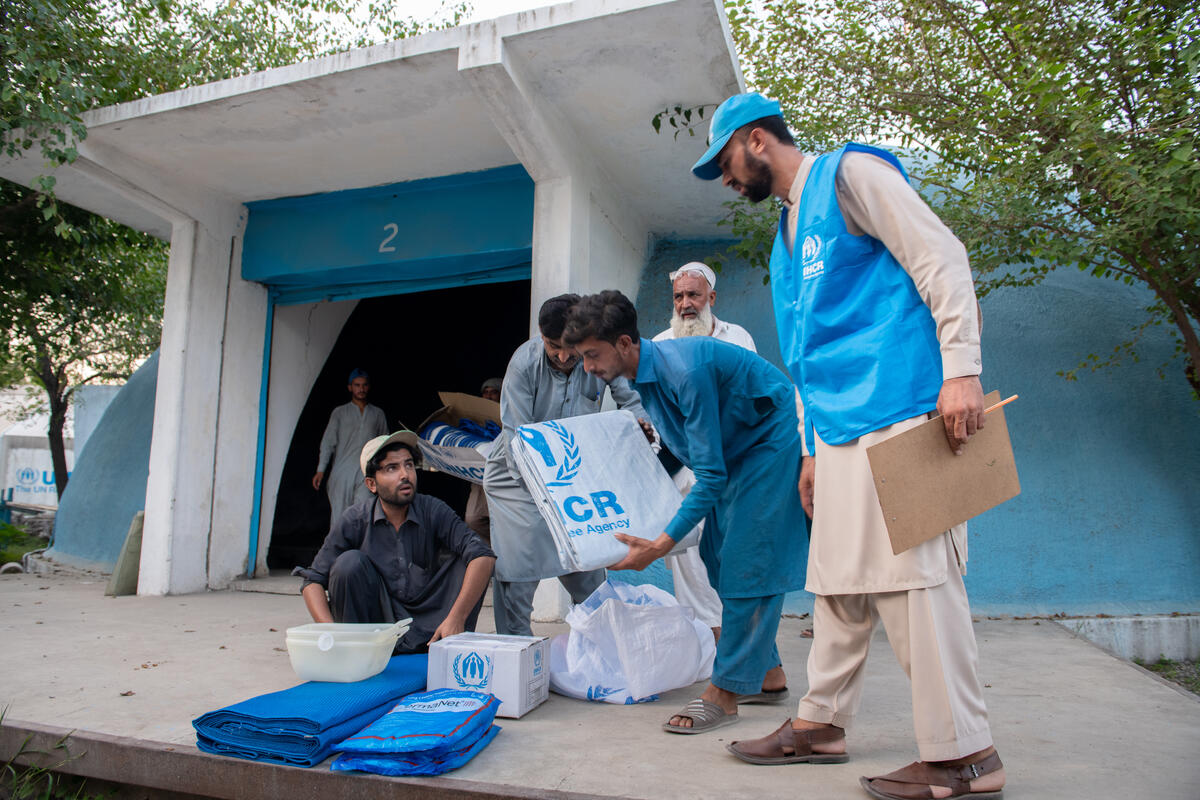UNHCR on target to deliver 2,410 tons of aid for Iraqi displaced
UNHCR on target to deliver 2,410 tons of aid for Iraqi displaced

GENEVA, August 22 (UNHCR) - The UN refugee agency on Friday said a massive aid push for some 500,000 displaced Iraqis was going to plan, with a second airlift of aid to Erbil and more flights due today and tomorrow.
The operation began on Wednesday and a second flight landed in the Iraqi Kurdistan city of Erbil on Thursday with more tents. Also on Thursday, UNHCR loaded 16 containers of aid (kitchen sets, blankets and jerry cans) from warehouses in Dubai onto a ship due to sail to Bandar Abbas in Iran on Saturday. From there it will be loaded onto trucks for Erbil.
"This is part of our massive operation to ship in 2,410 tons of aid by air, land and sea over about 10 days for some 500,000 displaced people inside Iraq," UNHCR spokesman Adrian Edwards told journalists in Geneva.
In north-east Syria, where thousands of mainly ethnic Yazidi refugees have fled since early August, the airlift of supplies from Damascus to Qamishli is going smoothly. The fourth out of six flights arrived on Thursday with more tents, mattresses, wheelchairs, household items and rechargeable fans.
The aid is being used to improve crowded conditions in the Newroz camp (where an estimated 6,000 people reside), and provide more privacy to the families. Movement in and out of the camp has stabilized in recent days. Another 3,000 Yazidis are staying in nearby towns and villages.
Meanwhile, inside Iraq, shelter remains a top priority for displaced people - too many of whom are living in dreadful conditions. The Kurdistan region of Iraq is now hosting close to 700,000 displaced Iraqis, most having arrived in early June.
"While accurate figures are not expected until early September when registration is complete, we estimate that hundreds of thousands are living in unfinished buildings, mosques, churches, parks and schools," Edwards noted.
Citing official estimates, he said half of the 5,746 schools in Iraqi Kurdistan are now sheltering displaced people or the military, raising concerns that they will not be able to open as scheduled for the new school year on September 10.
"While camps are often viewed as a last resort, displaced Iraqis are moving into them as quickly as tents can be pitched - such is the enormity of this crisis and the desperate need for shelter," Edwards said.
Currently, there are two tented camps, Badjet Kandela in Duhok governorate and Baharka in Erbil, which are open and housing more than 21,000 people. Twelve more camps will open soon, including three in Sulaymaniyah, six in Dohuk and three in Erbil - after which there will be a total camp capacity of more than 85,000. There are also a handful of privately-run camps in Dohuk. Officials from the Kurdistan regional government are reviewing locations for more camps.
Apart from the struggle to meet basic needs for food, water and shelter, a pressing issue for displaced people who fled their homes with next to nothing is a lack of documents - critical for being registered and getting cash assistance.
Most displaced people have been unable to replace key personal documentation without returning to their areas of origin. UNHCR is providing legal assistance to internally displaced people to help them replace key documents so they can register for aid and move freely.
"There is also an urgent need to strengthen psychological services for displaced people, many of whom are deeply traumatized with the suddenness of their own flight, the death of loved ones, the separation of families, and horrific reports about the fate of others left behind, killed or captured," UNHCR's Edwards said.
"Our protection teams tells us of continuing reports of women, particularly from minority groups, abducted by armed groups [in Mosul and Sinjar] and held in various locations. Some have reportedly been forced to convert to Islam, and there are reports of others being trafficked by armed groups, inside and out of Iraq," he added.
UNHCR appreciates the support of donors for its Iraq operation, particularly Saudi Arabia which has provided US$88.3 million to UNHCR as part of a US$500 million donation to UN operations overall.









